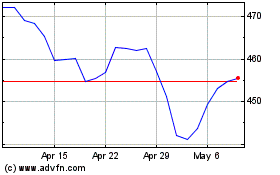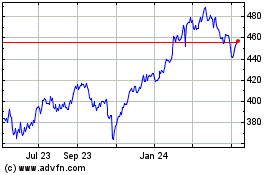By Robin Sidel
Visa Inc. and MasterCard Inc. on Thursday offered an olive
branch to merchants who haven't yet started accepting more secure
chip cards, saying they would speed up the certification process
for check-out terminals and limit the costs that retailers will
have to incur for counterfeit transactions.
The moves follow widespread complaints from merchants around the
country since October. That was when new payment-industry rules
shifted the financial responsibility for the cost of fraud to the
merchants from card-issuing financial institutions.
Merchants contend that their transition to chip cards has been
delayed by certification bottlenecks, forcing them to pay for fraud
even when they have the proper equipment in place to start
accepting chip cards. A Florida supermarket chain filed an
antitrust lawsuit in March against Visa, MasterCard and assorted
banks over the issue.
The changes announced Thursday are the latest part of a
difficult transition in the U.S. payments industry, which is
adopting the new chip cards years after other countries. In
addition to the complaints about certification delays, merchants
and shoppers have complained that the chip-card transactions take
too long at the check-out line.
Some 1.2 million merchant locations are now accepting chip cards
in the U.S. and more than 300 million chip-enabled credit cards and
debit cards are in customer wallets, according to Visa. The chip
cards have been used around the rest of the world for years.
"We're very encouraged by the progress to date but we recognize
that this marketplace is very complex and we still have work to do
to get merchants through the pipeline," said Mark Nelsen, Visa's
senior vice president for risk products, in an interview.
Visa and MasterCard said that they would simplify the process by
which equipment gets certified and take other steps that could
halve the time frame for chip-card acceptance.
The new cards are embedded with a computer chip that creates a
one-time code for each transaction that makes it less attractive
for criminals to produce counterfeit cards. Traditional cards have
a magnetic strip on the back that contains static customer data
that criminals can steal and use.
Customers must insert the new cards into a slot at the bottom of
the check-out terminal rather than swiping it.
To accept chip-card transactions, merchants need new equipment
that must then go through extensive testing and certification by
companies that process their transactions. Such equipment is
already in place and operating at many of the nation's largest
merchants, including Wal-Mart Stores Inc. and Target Corp.
Other merchants, however, have been slower to accept chip cards.
Many regional grocery chains, for example, still require their
customers to swipe cards.
Among other things, Visa and MasterCard said it is reducing the
number of tests that must be conducted on the terminals to mainly
focus on ensuring the equipment can generate the one-time code
required for more secure transactions.
"Anything helps. I'm glad that Visa and MasterCard are starting
to take notice," said Patrick Coughlin, a lawyer at Robbins Geller
Rudman & Dowd LLP who represents the Florida merchant that
filed the lawsuit. He said B&R Supermarket, the plaintiff in
the case, has the chip-card equipment, but still hasn't been
certified.
The changes could reduce certification-testing time to a couple
of hours from as long as a couple of weeks, said Chiro Aikat,
senior vice president for product delivery at MasterCard.
Merchant representatives said the changes will help, although
they noted that retailers won't be reimbursed for the money they
have already spent.
"This may offer some relief in the future, but it doesn't do
much for merchants who have been waiting for months to get
certified by an understaffed system," said Mallory Duncan, general
counsel for the National Retail Federation.
In another move to appease merchants, Visa and MasterCard are
modifying their fraud-cost rules to ease the financial burden on
merchants who aren't yet accepting chip cards. J.P. Morgan Chase
& Co., the nation's largest credit-card issuer, declined to
comment on the change that may increase its fraud costs.
Visa said card-issuing banks would stop sending fraud costs,
known as chargebacks, to merchants on transactions below $25. The
change in policy, which takes effect July 22, means that banks will
again be required to pay for that fraud.
Visa also said merchants would only be responsible for
chargebacks on a maximum of 10 transactions per account, with banks
assuming liability above that level starting in October. Consumers
who don't check their statements frequently can be the victim of
fraud multiple times before they notice the fraudulent charges and
alert their card issuer.
Visa said the changes, which are in effect until April 2018,
could result in 40% fewer chargebacks for merchants.
MasterCard said it would also take additional steps to ensure
that chargebacks received by merchants are valid. Details of those
efforts are expected to be announced in coming weeks.
Merchants and card companies have battled over fees and security
for years. Earlier this week, Home Depot Inc. filed an antitrust
suit against Visa and MasterCard, saying that merchants pay too
much for card transactions and contending that the new chip cards
don't do enough to reduce fraud.
Write to Robin Sidel at robin.sidel@wsj.com
(END) Dow Jones Newswires
June 16, 2016 17:04 ET (21:04 GMT)
Copyright (c) 2016 Dow Jones & Company, Inc.
MasterCard (NYSE:MA)
Historical Stock Chart
From Mar 2024 to Apr 2024

MasterCard (NYSE:MA)
Historical Stock Chart
From Apr 2023 to Apr 2024
